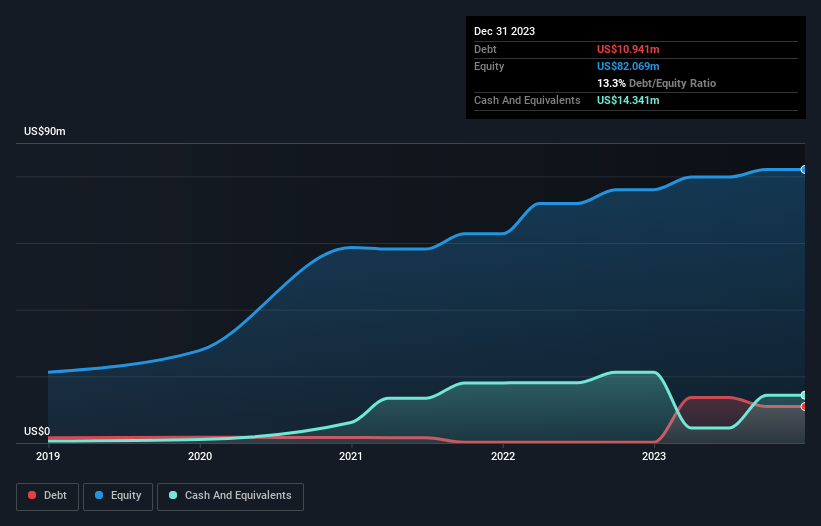- United Kingdom
- /
- Professional Services
- /
- AIM:PPHC
Does Public Policy Holding Company (LON:PPHC) Have A Healthy Balance Sheet?
David Iben put it well when he said, 'Volatility is not a risk we care about. What we care about is avoiding the permanent loss of capital.' When we think about how risky a company is, we always like to look at its use of debt, since debt overload can lead to ruin. As with many other companies Public Policy Holding Company, Inc. (LON:PPHC) makes use of debt. But the more important question is: how much risk is that debt creating?
Why Does Debt Bring Risk?
Generally speaking, debt only becomes a real problem when a company can't easily pay it off, either by raising capital or with its own cash flow. Part and parcel of capitalism is the process of 'creative destruction' where failed businesses are mercilessly liquidated by their bankers. However, a more common (but still painful) scenario is that it has to raise new equity capital at a low price, thus permanently diluting shareholders. Of course, the upside of debt is that it often represents cheap capital, especially when it replaces dilution in a company with the ability to reinvest at high rates of return. The first thing to do when considering how much debt a business uses is to look at its cash and debt together.
See our latest analysis for Public Policy Holding Company
What Is Public Policy Holding Company's Debt?
You can click the graphic below for the historical numbers, but it shows that as of December 2023 Public Policy Holding Company had US$10.9m of debt, an increase on US$210.6k, over one year. But it also has US$14.3m in cash to offset that, meaning it has US$3.40m net cash.

A Look At Public Policy Holding Company's Liabilities
According to the last reported balance sheet, Public Policy Holding Company had liabilities of US$30.3m due within 12 months, and liabilities of US$35.3m due beyond 12 months. Offsetting this, it had US$14.3m in cash and US$16.4m in receivables that were due within 12 months. So its liabilities outweigh the sum of its cash and (near-term) receivables by US$34.8m.
Given Public Policy Holding Company has a market capitalization of US$186.6m, it's hard to believe these liabilities pose much threat. Having said that, it's clear that we should continue to monitor its balance sheet, lest it change for the worse. Despite its noteworthy liabilities, Public Policy Holding Company boasts net cash, so it's fair to say it does not have a heavy debt load! When analysing debt levels, the balance sheet is the obvious place to start. But it is future earnings, more than anything, that will determine Public Policy Holding Company's ability to maintain a healthy balance sheet going forward. So if you want to see what the professionals think, you might find this free report on analyst profit forecasts to be interesting.
In the last year Public Policy Holding Company wasn't profitable at an EBIT level, but managed to grow its revenue by 24%, to US$135m. Shareholders probably have their fingers crossed that it can grow its way to profits.
So How Risky Is Public Policy Holding Company?
While Public Policy Holding Company lost money on an earnings before interest and tax (EBIT) level, it actually generated positive free cash flow US$21m. So taking that on face value, and considering the net cash situation, we don't think that the stock is too risky in the near term. The good news for Public Policy Holding Company shareholders is that its revenue growth is strong, making it easier to raise capital if need be. But we still think it's somewhat risky. When analysing debt levels, the balance sheet is the obvious place to start. But ultimately, every company can contain risks that exist outside of the balance sheet. For example Public Policy Holding Company has 3 warning signs (and 1 which is a bit concerning) we think you should know about.
If you're interested in investing in businesses that can grow profits without the burden of debt, then check out this free list of growing businesses that have net cash on the balance sheet.
New: Manage All Your Stock Portfolios in One Place
We've created the ultimate portfolio companion for stock investors, and it's free.
• Connect an unlimited number of Portfolios and see your total in one currency
• Be alerted to new Warning Signs or Risks via email or mobile
• Track the Fair Value of your stocks
Have feedback on this article? Concerned about the content? Get in touch with us directly. Alternatively, email editorial-team (at) simplywallst.com.
This article by Simply Wall St is general in nature. We provide commentary based on historical data and analyst forecasts only using an unbiased methodology and our articles are not intended to be financial advice. It does not constitute a recommendation to buy or sell any stock, and does not take account of your objectives, or your financial situation. We aim to bring you long-term focused analysis driven by fundamental data. Note that our analysis may not factor in the latest price-sensitive company announcements or qualitative material. Simply Wall St has no position in any stocks mentioned.
About AIM:PPHC
Public Policy Holding Company
Provides consulting services in the United States.
Reasonable growth potential and slightly overvalued.
Market Insights
Community Narratives



